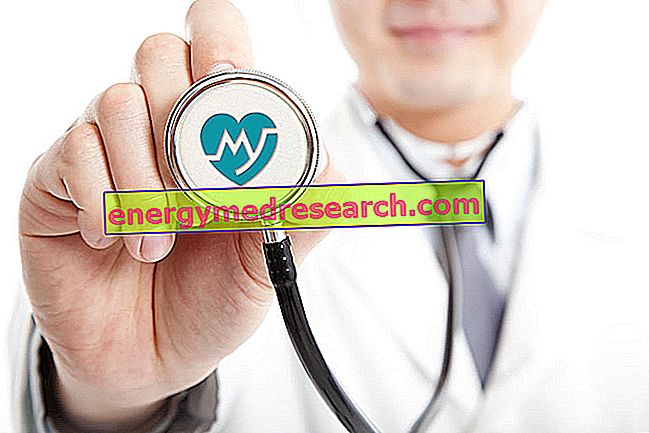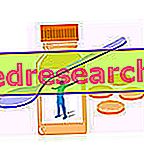Exemestane is an anticancer drug belonging to the class of aromatase inhibitors. Aromatase is an enzyme involved in the production of estrogen (female sex hormones).

Exemestane - Chemical Structure
Thanks to this activity, exemestane can be used to treat hormone-sensitive tumors.
Indications
For what it uses
The use of exemestane is indicated in the treatment of breast cancer - both initial and advanced - in post-menopausal women (natural or induced).
Exemestane could also be used in male breast cancer.
Warnings
Exemestane should not be used in patients with pre-menopausal endocrine status.
Attention should be paid to the administration of exemestane in patients suffering from pre-existing liver and / or renal dysfunction.
Since exemestane reduces bone mineral density, women with osteoporosis - or at risk of developing osteoporosis - should undergo periodic assessments of bone health throughout the period of treatment with the drug. Prophylaxis treatment may need to be started in patients at risk of osteoporosis.
Exemestane can cause drowsiness and dizziness, if these symptoms appear the physical and / or mental abilities necessary for driving vehicles or using machinery can be altered.
Interactions
The therapeutic efficacy of exemestane can be reduced by the simultaneous administration of drugs such as:
- Rifampicin (an antibiotic);
- Phenytoin and carbamazepine (drugs used to treat epilepsy);
- Hypericum based preparations, also known as St. John's wort (a plant with antidepressant properties).
Exemestane should not be administered concomitantly with estrogen- containing drugs, since the latter would nullify its pharmacological action.
It is however necessary to inform your doctor if you are taking - or have recently been taken - medicines of any kind, including over-the-counter drugs, herbal and / or homeopathic products.
Side effects
Exemestane can cause various side effects. The type of side effects that appear and the intensity with which they occur can vary from individual to individual. This happens because each patient responds to chemotherapy in a different way, depending on the sensitivity he has towards the drug.
The following are the main side effects that may occur following therapy with the drug.
Hot flashes and increased sweating
Exemestane therapy can cause hot flashes and increased sweating. These symptoms usually present in mild form, but - should they occur in severe form - it is necessary to inform the doctor.
Alopecia
Treatment with exemestane can cause hair and hair to fall out in general that can thin out or fall off completely. This side effect is however temporary. Hair and hair should begin to regrow shortly after the end of therapy.
Bone disorders
Exemestane therapy can cause a reduction in bone mineral density, with an increased risk of bone fractures and / or an increased risk of developing osteoporosis .
The doctor - in conjunction with periodic analysis of bone densitometry - may decide to prescribe the intake of calcium and vitamin D.
Gastrointestinal disorders
The use of exemestane can cause nausea, vomiting and diarrhea .
The sense of nausea often decreases if the drug is taken near mealtime or before bedtime.
Vomiting can be treated with anti-emetic drugs (antivomito), while diarrhea can be kept under control by the use of antidiarrheal drugs. In any case, it is good to drink a lot in order to replenish the lost liquids. If - despite the use of drugs - the symptoms persist it is necessary to inform the doctor.
Furthermore, exemestane can cause abdominal pain, dyspepsia and constipation .
Nervous system disorders
Exemestane therapy can cause fatigue, weakness, dizziness, headache and dizziness . If these symptoms occur, it is advisable to inform your doctor that - if he deems it necessary - he can prescribe drug treatment.
Joint and muscle pains
Exemestane can cause pain in joints and muscles . These symptoms can be easily controlled by the use of common analgesic drugs that can be prescribed by the doctor. Exemestane can also cause muscle stiffness .
Psychiatric disorders
Treatment with exemestane can cause insomnia and promote the appearance of depression .
Hepatobiliary disorders
Although it is not a very common side effect, the use of exemestane can promote the occurrence of hepatitis . Furthermore, exemestane may increase the blood concentration of alkaline phosphatase and bilirubin.
Skin and subcutaneous tissue disorders
Exemestane therapy can cause skin rashes, hives and itching . Moreover, cases have been reported - although rare - of acute generalized exanthematous pustulosis (a reaction characterized by the sudden appearance of an erythematous-edematous eruption, with the presence of small superficial pustules) often associated with fever.
Other side effects
Other side effects that may occur following treatment with exemestane are:
- Hypersensitivity reactions in sensitive subjects;
- Carpal tunnel syndrome;
- Anorexia;
- Pain at the site of administration;
- Peripheral edema;
- Asthenia;
- Decreased appetite;
- Pain and / or swelling in the hands and feet;
- Plateletopenia (ie a decrease in the number of platelets in the bloodstream), this leads to an increased risk of abnormal bleeding and / or bleeding;
- Leukopenia, ie a decrease in the levels of white blood cells in the blood; this decrease makes patients more susceptible to contracting infections.
Overdose
There is no antidote for exemestane overdose. If you suspect that you have overdosed, you should immediately inform the doctor who will decide what to do. Overdose therapy is only symptomatic, close observation of the patient and frequent monitoring of vital signs are indicated.
Action mechanism
Some forms of breast cancer need estrogen to survive.
In pre-menopause, estrogens are mainly produced in the ovaries. In post-menopause, on the other hand, the ovaries lose their functional capacity, but estrogens continue to be synthesized - even if in minimal quantities - in peripheral adipose tissues, such as those found in the breast. Estrogens are produced by conversion of androgens (male sex hormones) by an enzyme called aromatase.
Exemestane is an irreversible steroid-type inhibitor of the aromatase enzyme and - as such - is able to block the synthesis of estrogens.
Since it has high binding affinity and specificity towards aromatase, exemestane is able to suppress its 97.7% activity. The tumor cells are found - in substance - totally deprived of a molecule essential for them, therefore they die.
Mode of Use - Posology
Exemestane is available for oral administration. It is found in the form of whitish tablets that should preferably be taken on a full stomach and always at the same time. The absorption of the drug, in general, increases if it is taken immediately after a meal rich in fat.
The usual dosage is one tablet - containing 25 mg of active ingredient - to be taken once a day.
The duration of treatment must be established by the doctor.
Pregnancy and breastfeeding
Exemestane should only be used by post-menopausal women, therefore, use during pregnancy is contraindicated.
Breast-feeding mothers should not take the drug.
Contraindications
The administration of exemestane is contraindicated in the following cases:
- Hypersensitivity known to exemestane;
- In pre-menopausal patients;
- In children and adolescents;
- Pregnant;
- During breastfeeding.



